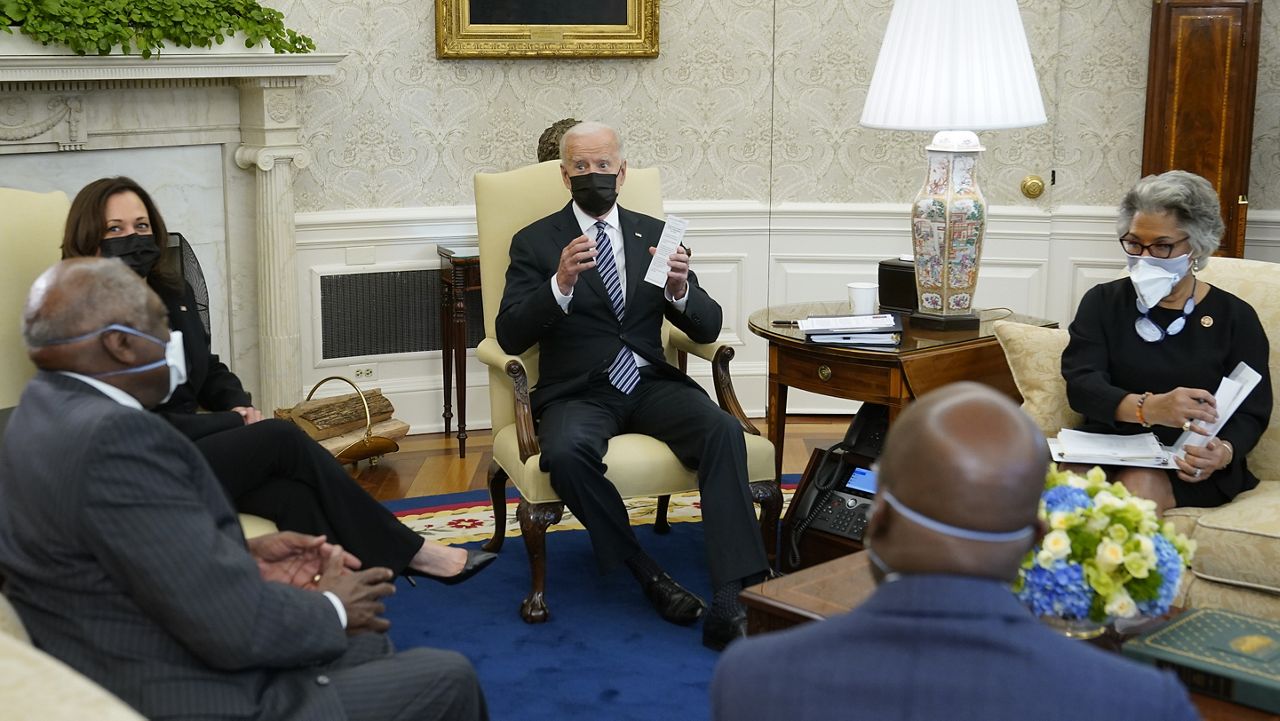President Joe Biden and Vice President Kamala Harris met with members of the Congressional Black Caucus on Tuesday as the administration continues its outreach to lawmakers amid the push to pass their proposed $2 trillion infrastructure plan.
Biden began by expressing his condolences to the members "the loss that you have had" of Florida Rep. Alcee Hastings, who passed away earlier this month. Hastings was a longtime member of the Congressional Black Caucus who Biden "knew for a long, long time."
The president also addressed the "godawful shooting" of Daunte Wright in Minnesota, which he also spoke about on Monday, as well as the trial of Derek Chauvin, the officer charged with killing George Floyd. Vice President Harris addressed the shooting earlier Tuesday ahead of a meeting on Black maternal health.
"Before we get started I do want to address the killing of Daunte Wright," Vice President Harris said. "He should be alive today."
"To his family and loved ones, you must know that the president and I grieve with you as the nation grieves his loss and we stand with you," she said, adding: "Law enforcement must be held to the highest standards of accountability."
The president and the CBC members discussed racial equity, noting an executive order that he signed advancing racial equity and supporting underserved communities. "Every single aspect of our government ... every agency has a primary focus of dealing with equity," Biden said.
Biden also added that they have "an awful lot to deal with" when it comes to "advancing economic opportunity," saying that he hoped to "take some special time" to discuss his $2 trillion infrastructure plan, the American Jobs Act.
"I think we can make significant, significant changes in the last legislation and help the past, reduce child poverty and reduce poverty black communities significantly just by that act alone," the president said. "But my objective there is to make this change."
According to the White House, the group will voting rights, racial equity and how the infrastructure investments in the American Jobs Plan will advance racial equity and redress historic inequities.
Lawmakers attending the meeting will include:
- Rep. Joyce Beatty (D-OH)
- Rep. Steven Horsford (D-NV)
- Rep. Brenda Lawrence (D-MI)
- Rep. Hank Johnson (D-GA)
- Rep. Sheila Jackson-Lee (D-TX)
- Rep. Frederica Wilson (D-FL)
- Rep. Joe Neguse (D-CO)
- House Majority Whip Rep. Jim Clyburn (D-SC)
- Sen. Cory Booker (D-NJ)
- Sen. Raphael Warnock (D-GA)
The Congressional Black Caucus, founded in 1971, is "committed to using the full Constitutional power, statutory authority, and financial resources of the federal government to ensure that African Americans and other marginalized communities in the United States have the opportunity to achieve the American Dream" and seeks to be "voice for people of color and vulnerable communities in Congress." The group's goals are listed as equity, economic empowerment, and engagement.
The group consists of 57 members of Congress, all from the Democratic party – 55 are in the House of Representatives, including two non-voting Delegates, Eleanor Holmes Norton of Washington, D.C., and Stacey Plaskett of the U.S. Virgin Islands, and two serve in the Senate.
One of the major pushes in President Biden's infrastructure proposal is addressing systemic racism and racial inequity in infrastructure, including $20 billion set aside for "a new program that will reconnect neighborhoods cut off by historic investments and ensure new projects increase opportunity, advance racial equity and environmental justice, and promote affordable access," the White House said.
“Black and brown neighborhoods have been disproportionately divided by highway projects or left isolated by the lack of adequate transit and transportation resources,” Transportation Secretary Pete Buttigieg, a major player in the administration's infrastructure proposal, wrote on Twitter in December, adding that under Biden and Harris, "we will make righting these wrongs an imperative.”
Earlier Tuesday, Vice President Harris held a roundtable event on Black maternal health, highlighting the disparities that Black women face when it comes to health matters such as pregnancy, childbirth and postpartum.



